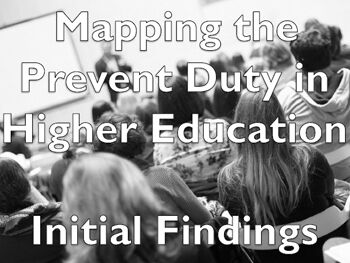University News Last updated 29 July 2019

New research suggests that higher education institutions may be disproportionate in their interpreting and implementing of the Prevent Duty.
Using Freedom of Information (FOI) requests the research found HE staff responsibilities have repositioned into the domain of counter-terrorism and have ensured that staff scrutinize their students, research and invited external speakers for evidence of radicalisation or extremism.
The study saw researchers from Birmingham City University issue FOI requests to 157 HEIs with questions focussing on organisational structures, staff guidance, training and the number of referrals made to Channel between 2015 (when the Counter Terrorism and Security Act came into force) and 2018.
The FOIs also showed there were only 25 confirmed referrals to Channel across 140 HEIs within England and Wales (Channel is not in effect in Scotland) with 64% of these institutions making zero referrals. This suggests that only in very rare circumstances did HEIs feel they needed to go outside of their institution in responding to causes for concern, calling into question both the level of risk and the proportionality of the Duty.
Justifications for the referrals that had been made included:
- Attempting to view an extremist website;
- Behaviour witnessed on campus;
- Proclamations on social media about being a god/prophet and the rights/wrongdoings of the Quran/Bible.
The research has been undertaken at Birmingham City University’s School of Social Sciences by Dr Andrew Whiting, Professor Imran Awan, Dr Keith Spiller and Ben Campbell.
Professor Awan said: “Prevent has been controversial since its inception and risks marginalising and stigmatising people it claims to be helping.
“There appears to be a distinct uncertainty and nervousness about Prevent from Universities and this is nowhere more evident than in the wide range of new institutional policies and bureaucratic practices that have been produced in compliance with the Duty” added Dr Keith Spiller.
Dr Whiting said, “Universities have always had a duty to provide a safe and supportive environment for students and staff. However, our findings demonstrate how extensively Prevent has become integrated into HEIs and given the low risk here calls into question the proportionality of this governmental response. We hope our report can shed light on how the Duty looks with higher education and stimulate further discussion about its arrival in the sector ahead of the upcoming independent review.”
The academics are currently preparing for the second phase of the research project, which will see them engaging with staff and students to capture insights into individuals’ first-hand experiences of Prevent.